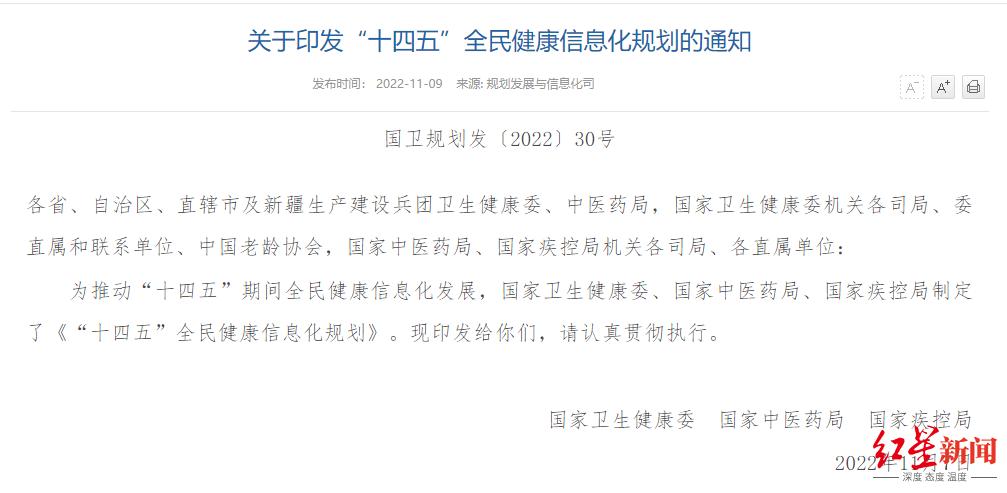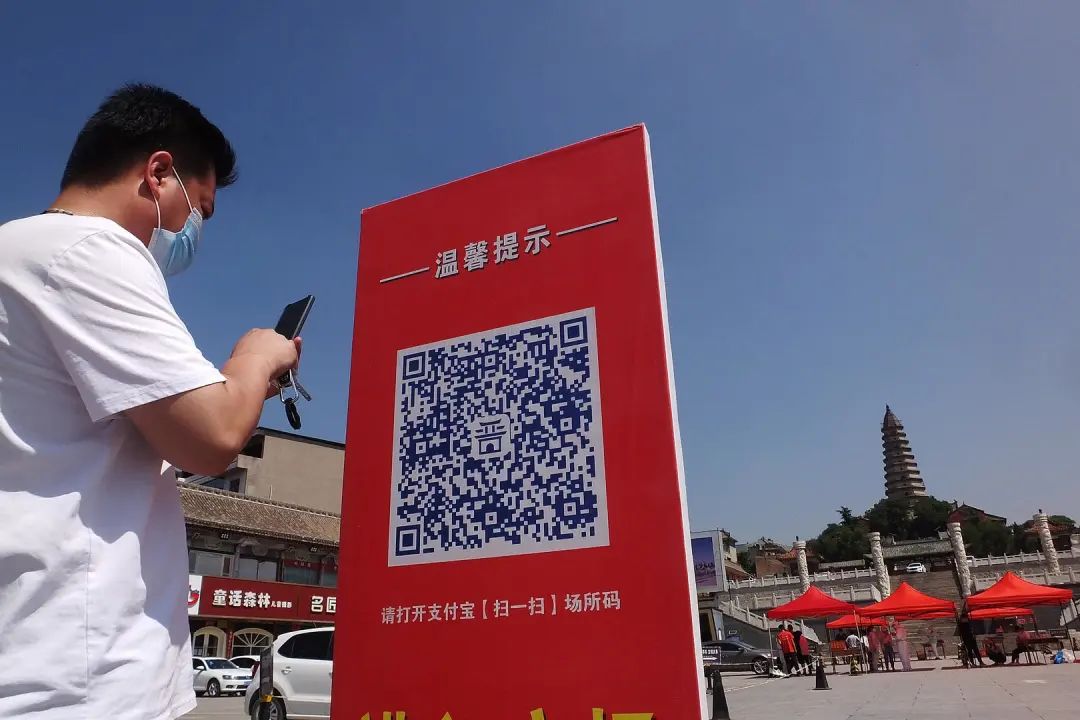Every resident will have it! What is an electronic health code? Will it reveal privacy?
On November 9th, according to the information of National Health Commission official website, National Health Commission, the State Administration of Traditional Chinese Medicine and the State Bureau of Disease Control and Prevention have jointly issued the "Tenth Five-Year Plan for National Health Informatization" (hereinafter referred to as the "Plan"), proposing that by 2025, a unified, authoritative and interconnected national health information platform support and guarantee system will be initially established, and the full coverage of public medical and health institutions and the national health information platform will be basically realized.
Among them, the "Planning" mentioned that "in 2025, every resident will have a dynamically managed electronic health record and a fully functional electronic health code". This content has attracted attention. On November 10th, Wei Zining, Dean of Management Development Research Institute of Beijing Sanyi Zhiku Hospital, said in an interview with Red Star News reporter that the health code mentioned in the Plan is not a health code or a travel code set to deal with the COVID-19 epidemic, but actually it is more like a personal electronic health record of residents. Such a health code is also set to make use of big data and the Internet to better serve residents, and people do not have to worry too much about privacy, travel leakage and other issues.

National Health Commission, the State Administration of Traditional Chinese Medicine and the State Bureau of Disease Control and Prevention have jointly issued the "14 th Five-Year Plan for National Health Informatization"
Hot discussion on the whole network:
Residents have fully functional electronic health codes.
Some netizens are worried that privacy will be leaked.
The Red Star journalist noted that the "Planning" has deployed eight main tasks for the future, namely, intensive construction of information infrastructure support system; Improve the national health informatization standard system; Deepen the "Internet+medical health" service system; Improve the system of big data resources for health care; Promote digital health integration and innovative development system; Expand the basic information security service system; Strengthen the application system of health statistics investigation and analysis; Consolidate the network and data security system.
In addition, the "Planning" also puts forward eight priority actions: sharing and sharing three years of hard work; Healthy China construction (action) supporting action; Demonstration action of smart hospital construction; Intelligent service action for key populations; Intelligent monitoring and response actions for drug supply guarantee; Digital public health capacity improvement action; "internet plus Traditional Chinese Medicine Health Service" action; Data security capability improvement action.
In recent years, the word "health code" has become a high-frequency word in life. After combing, Red Star journalists found that the word health code was mentioned five times in Planning. Among them, when talking about the overall improvement of emergency response capacity for epidemic prevention and control, the Plan mentioned "promoting the unification of health code policies and standards, realizing the national sharing of nucleic acid test results and vaccination information in Covid-19, ensuring the orderly travel of the masses, and efficiently coordinating epidemic prevention and control and social and economic development." In terms of development goals, the Plan proposes that "every resident has a dynamically managed electronic health record and a fully functional electronic health code".
In addition, the Plan also mentioned that in the main tasks of the 14 th Five-Year Plan for National Health Informatization, the issue of health code was also mentioned in the part of promoting the digital health integration and innovation development system, sharing and sharing the three-year attack, and improving the digital public health capacity. The Plan mentions that it is necessary to "gradually realize the multi-code integration of electronic health code, medical insurance settlement code and financial payment code", and to "take the popularization and application of residents’ electronic health code as the starting point, establish the only main index for residents with ID card numbers as the main index and other certificate numbers as the supplement, and promote" one code for universal use ". In addition, the Plan also mentions "strengthening the use of health code standards, strengthening the implementation of coding and transcoding rules, and promoting mutual recognition and one code communication".
Red Star News reporter noticed that netizens are particularly concerned about the article "every resident has a dynamically managed electronic health record and a fully functional electronic health code". Some netizens have doubts and asked, "Is this health code a trip code?" "Will setting such a health code violate my privacy?"

On July 6, 2022, in Yuncheng, Shanxi Province, a resident scanned the code at the nucleic acid detection point in Xinjiang County for nucleic acid detection. According to vision china
Expert interpretation:
Like mobile electronic health records.
Don’t worry too much about privacy leaks.
For all kinds of questions raised by netizens, Wei Zining, dean of the Management Development Research Institute of Beijing Sanyi Zhiku Hospital, told Red Star News reporter that this health code was not built during the COVID-19 epidemic, and it was not a trip code. The health code in Planning was more like a mobile electronic health record of residents.
"The health code mentioned in the plan is more like an electronic file of residents, which may contain health information of everyone from birth to death. Such as vaccination, case information, family genetic diseases, etc. " Wei Zi-ning said that the health code we often talk about now is actually set up to cope with the epidemic situation in COVID-19. We can see whether the residents have done nucleic acid, whether they are negative or positive, and how many days they have done it. The health code mentioned in the Plan should have a much more comprehensive function than the (current) health code.
Wei Zining said that the setting of the electronic health code mentioned in the Plan can better help doctors understand the personal health status of patients. "Your past medical history and medical records may all be in this health code. When you go to see a doctor, the doctor can fully grasp it in order to make a more scientific diagnosis of the patient."
Wang Chenguang, a professor at Tsinghua University Law School and executive vice president of China Health Law Society, has similar views with Wei Zi-ning. Wang Chenguang told the Red Star journalist that the electronic health code mentioned in the Plan is actually a comprehensive personal health information file, which is used by China to better serve residents’ health by using the Internet and big data.
"At present, the functions of this health code are not completely determined. It may include some functions of this health code currently used to fight the COVID-19 epidemic, but this part of the function is only a small part of it." Wang Chenguang said that with the development of the times, the mobility of people is also increasing. If you have such a health code, it means that everyone’s health information is carried with you. For example, if there is an accident or illness in any area, doctors can know this person’s historical health information through this health code, so as to give the most accurate treatment.
For some netizens who are worried that the health code will reveal personal information, both experts said that this kind of worry is actually unnecessary. "This health code is placed in your personal mobile phone every day. If you don’t show it to others, you should not be able to find it at will, including doctors. Only after my consent, in the case of medical treatment and vaccination, relevant information will be displayed." Wei Zining said.
Wang Chenguang, on the other hand, said that people’s worries about the disclosure of personal privacy are not unreasonable, but there is no need to worry too much. "When building the health code, the relevant institutions definitely need to collect and store personal health information, but this behavior is to protect the health of residents, not to infringe on the privacy of citizens."
Wang Chenguang said that our society is now an information society, and the appearance of this kind of health code is inevitable, which is a normal use of information. Relevant institutions will also prevent people with ulterior motives from maliciously invading when building, and laws and regulations will also regulate the use of health codes.
Red Star Journalist Wu Yang Special correspondent Shui Ning
Original title: "Every resident will have it! What is an electronic health code? Will it reveal privacy? 》
Read the original text